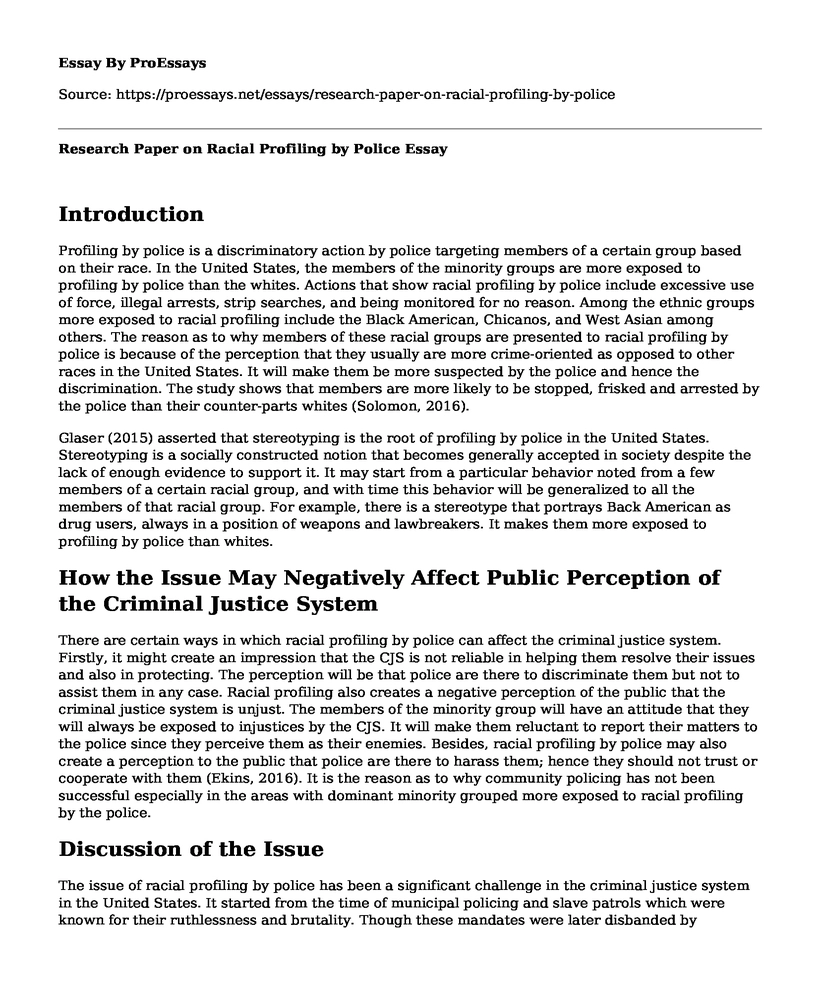Introduction
Profiling by police is a discriminatory action by police targeting members of a certain group based on their race. In the United States, the members of the minority groups are more exposed to profiling by police than the whites. Actions that show racial profiling by police include excessive use of force, illegal arrests, strip searches, and being monitored for no reason. Among the ethnic groups more exposed to racial profiling include the Black American, Chicanos, and West Asian among others. The reason as to why members of these racial groups are presented to racial profiling by police is because of the perception that they usually are more crime-oriented as opposed to other races in the United States. It will make them be more suspected by the police and hence the discrimination. The study shows that members are more likely to be stopped, frisked and arrested by the police than their counter-parts whites (Solomon, 2016).
Glaser (2015) asserted that stereotyping is the root of profiling by police in the United States. Stereotyping is a socially constructed notion that becomes generally accepted in society despite the lack of enough evidence to support it. It may start from a particular behavior noted from a few members of a certain racial group, and with time this behavior will be generalized to all the members of that racial group. For example, there is a stereotype that portrays Back American as drug users, always in a position of weapons and lawbreakers. It makes them more exposed to profiling by police than whites.
How the Issue May Negatively Affect Public Perception of the Criminal Justice System
There are certain ways in which racial profiling by police can affect the criminal justice system. Firstly, it might create an impression that the CJS is not reliable in helping them resolve their issues and also in protecting. The perception will be that police are there to discriminate them but not to assist them in any case. Racial profiling also creates a negative perception of the public that the criminal justice system is unjust. The members of the minority group will have an attitude that they will always be exposed to injustices by the CJS. It will make them reluctant to report their matters to the police since they perceive them as their enemies. Besides, racial profiling by police may also create a perception to the public that police are there to harass them; hence they should not trust or cooperate with them (Ekins, 2016). It is the reason as to why community policing has not been successful especially in the areas with dominant minority grouped more exposed to racial profiling by the police.
Discussion of the Issue
The issue of racial profiling by police has been a significant challenge in the criminal justice system in the United States. It started from the time of municipal policing and slave patrols which were known for their ruthlessness and brutality. Though these mandates were later disbanded by constitutional amendment, the order of these historic policing has been passed on for decades unofficially. The minority groups such as the Black Americans have been discriminated by the police trough unlawful shooting and excessive use of force among others. In combating the injustices of the police, the law that enables any police officer who discriminates an individual based on race to be sued in a court of law has been enacted. Nevertheless, there is still evidence of racial profiling by the police such as the currently increased killing for the Black Americans even when they are not armed. However, despite many reported cases of racial profiling by police, many victims never get their justice as the court system will give unjust judgments to the police officers involved in such actions. Nevertheless, aspects such as body-worn cameras, community policing and more training for the police have currently been introduced to combat discrimination in the criminal justice system (Solomon, 2016).
Conclusion
Racial profiling by the police is an aspect that has been there all over policing history. Though there has been an attempt to combat it by use of law amendment, it persists. Stereotyping is the main root of racial profiling. It makes police to have a perception that members of a particular ethnic group are crime oriented and this makes them target them more like suspects. The impact of racial profiling on the police has been a negative perception toward the criminal justice system which contributes to a lack of trust and confidence on it. The criminal justice system has also failed to protect the minority group from racial profiling despite many laws put to prohibit it. However, the currently introduced interventions such as body-worn cameras, community policing and enhanced police training on how to effectively relate with the members of the public might be the only hope that can be used to reduce racial profiling by police.
References
Glaser, J. (2015). Suspect race: Causes and consequences of racial profiling. Oxford University Press, USA.
Solomon, D. (2016, September 1). The Intersection of Policing and Race. Retrieved from https://www.americanprogress.org/issues/race/reports/2016/09/01/143357/the-intersection-of-policing-and-race/
Ekins, E. (2016, December 7). Policing in America: Understanding Public Attitudes Toward the Police. Results from a National Survey. Retrieved from https://www.cato.org/survey-reports/policing-america
Cite this page
Research Paper on Racial Profiling by Police. (2022, Mar 24). Retrieved from https://proessays.net/essays/research-paper-on-racial-profiling-by-police
If you are the original author of this essay and no longer wish to have it published on the ProEssays website, please click below to request its removal:
- Paper Example on Women's Rights are Human Rights
- Sexual Abuse Towards Women of Color Paper Example
- Substance Abuse Support Programs - Essay Sample
- Training in San Jose Police Department Paper Example
- Essay Example on Ending Racism: Understanding Bona Fide Professional Qualification
- Immigrant: A Source of Utility and Economic Benefit - Essay Sample
- Harper Lee's To Kill a Mockingbird: Racism, Coming of Age & Judgment - Essay Sample







